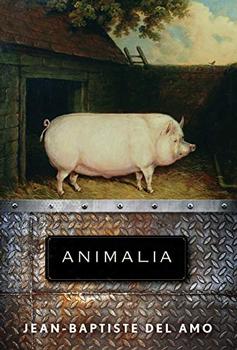
A dramatic and chilling tale of man and beast that recalls the naturalism of writers like Émile Zola, Animalia traverses the twentieth century as it examines man's quest to conquer nature, critiques the legacy of modernity and the transmission of violence from one generation to the next, and questions whether we can hold out hope for redemption in this brutal world.
The small village of Puy-Larroque, southwest France, 1898.
Éléonore is a child living with her father, a pig farmer whose terminal illness leaves him unable to work, and her God-fearing mother, who runs both farm and family with an iron hand. Éléonore passes her childhood with little heat and no running water, sharing a small room with her cousin Marcel, who does most of the physical labor on the farm. When World War I breaks out and the village empties, Éléonore gets a taste of the changes that will transform her world as the twentieth century rolls on. As the reader moves into the second part of the novel, which takes place in the 1980s, the untamed world of Puy-Larroque seems gone forever. Now, Éléonore has herself aged into the role of matriarch, and the family is running a large industrial pig farm, where thousands of pigs churn daily through cycles of birth, growth, and death. Moments of sublime beauty and powerful emotion mix with the thoughtless brutality waged against animals that makes the old horrors of death and disease seem like simpler times.
"The florid prose has an incantatory power well suited to the festering enmity, inhumanity, and majestic squalor on display. This uncompromising vision will leave readers breathless, thrilled, and exhausted." - Publishers Weekly (starred review)
"Tortured beasts are tended by soul-destroyed keepers in an unstinting portrait of all that's wrong with modern food production." - Kirkus Reviews
"This is an extraordinary book. A dark saga related in sprawling sentences, made denser still by obscure and difficult vocabulary...I was spellbound...A kind of savage reimagining of Thomas Hardy and D.H. Lawrence." - David Mills, The Times (UK)
"Likely to be hailed as a modern classic...A truly savage quality, all blood and stench and despair...Animalia is an important reminder that literature's task is not necessarily to uplift, but to help us to attain a true understanding of our predicament." - Ian Samson, The Guardian (UK)
"Animalia is stupendously good. This is a novel of epic scope and equally epic ambition, and it is exhilarating and frightening to read. Every page blazes with incandescent prose. After reading Animalia it might be a while before I can return to reading a contemporary novel, I suspect everything will seem tepid and timid in comparison. Del Amo has thrown down a gauntlet: be bold, be daring, be rigorous, be a poet. A stunning book." - Christos Tsiolkas, author of The Slap
This information about Animalia was first featured
in "The BookBrowse Review" - BookBrowse's membership magazine, and in our weekly "Publishing This Week" newsletter. Publication information is for the USA, and (unless stated otherwise) represents the first print edition. The reviews are necessarily limited to those that were available to us ahead of publication. If you are the publisher or author and feel that they do not properly reflect the range of media opinion now available, send us a message with the mainstream reviews that you would like to see added.
Any "Author Information" displayed below reflects the author's biography at the time this particular book was published.
Jean-Baptiste Del Amo is one of France's most exciting and ambitious young writers. He is the author of Pornographia, Le sel, and Une éducation libertine, which won the Goncourt First Novel Prize. Animalia, his fourth novel, is his first to appear in English.




He has only half learned the art of reading who has not added to it the more refined art of skipping and skimming
Click Here to find out who said this, as well as discovering other famous literary quotes!
Your guide toexceptional books
BookBrowse seeks out and recommends the best in contemporary fiction and nonfiction—books that not only engage and entertain but also deepen our understanding of ourselves and the world around us.